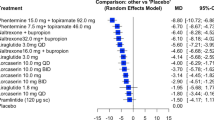Abstract
There is a rapid increase in trials assessing healthcare interventions consisting of a combination of drugs (polytherapies) or multiple components. In the latter type of interventions (also known as complex interventions), the aspect of complexity is of paramount importance. For example, nonpharmacological interventions, such as psychological interventions or self-management interventions, usually share common components that relate to the nature of intervention, who delivers it, or where and how. In a network of trials, there is often the need to identify the most effective (or safest) component and/or combination of components. Four key meta-analytical approaches have been presented in the literature to handle complex interventions. These include (a) the single-effect model, (b) the full interaction model, (c) the additive main effects model, and (d) the two-way interaction model. In this chapter, we present and discuss the advantages and limitations of these approaches. We illustrate these methods using a network that assesses the relative effects of self-management interventions on waist size in patients with type 2 diabetes.
Access this chapter
Tax calculation will be finalised at checkout
Purchases are for personal use only
Similar content being viewed by others
References
Welton NJ, Caldwell DM, Adamopoulos E et al (2009) Mixed treatment comparison meta-analysis of complex interventions: psychological interventions in coronary heart disease. Am J Epidemiol 169:1158–1165
Petticrew M (2011) When are complex interventions 'complex'? When are simple interventions 'simple'? Eur J Pub Health 21:397–398
Craig P, Dieppe P, Macintyre S et al (2008) Developing and evaluating complex interventions: the new Medical Research Council guidance. BMJ 337:a1655
James A, Yavchitz A, Ravaud P et al (2018) Node-making process in network meta-analysis of nonpharmacological treatment are poorly reported. J Clin Epidemiol 97:95–102
Mavridis D, Giannatsi M, Cipriani A et al (2015) A primer on network meta-analysis with emphasis on mental health. Evid Based Ment Health 18:40–46
Salanti G (2012) Indirect and mixed-treatment comparison, network, or multiple-treatments meta-analysis: many names, many benefits, many concerns for the next generation evidence synthesis tool. Res Synth Methods 3:80–97
Petropoulou M, Efthimiou O, Rücker G, Schwarzer G, Furukawa TA, Pompoli A et al (2021) A review of methods for addressing components of interventions inmeta-analysis. PLoS ONE 16(2):e0246631. https://doi.org/10.1371/journal.pone.0246631
Petropoulou M, Nikolakopoulou A, Veroniki AA et al (2017) Bibliographic study showed improving statistical methodology of network meta-analyses published between 1999 and 2015. J Clin Epidemiol 82:20–28
Zarin W, Veroniki AA, Nincic V et al (2017) Characteristics and knowledge synthesis approach for 456 network meta-analyses: a scoping review. BMC Med 15:3
Rucker G, Krahn U, Efthimiou O et al. (2020) netmeta: Network Meta-Analysis using Frequentist Methods. R package version 1.2-1:https://CRAN.R-project.org/package=netmeta
Rucker G, Petropoulou M, Schwarzer G (2020) Network meta-analysis of multicomponent interventions. Biom J 62:808–821
Ballester M, Orrego C, Heijmans M et al (2020) Comparing the effectiveness and cost-effectiveness of self-management interventions in four high-priority chronic conditions in Europe (COMPAR-EU): a research protocol. BMJ Open 10:e034680
Caldwell DM, Welton NJ (2016) Approaches for synthesising complex mental health interventions in meta-analysis. Evid Based Ment Health 19:16–21
Higgins JPT, Lopez-Lopez JA, Becker BJ et al (2019) Synthesising quantitative evidence in systematic reviews of complex health interventions. BMJ Glob Health 4:e000858
Tanner-Smith EE, Grant S (2018) Meta-analysis of complex interventions. Annu Rev Public Health 39:135–151
Thorlund K, Mills E (2012) Stability of additive treatment effects in multiple treatment comparison meta-analysis: a simulation study. Clin Epidemiol 4:75–85
Freeman SC, Scott NW, Powell R et al (2018) Component network meta-analysis identifies the most effective components of psychological preparation for adults undergoing surgery under general anesthesia. J Clin Epidemiol 98:105–116
Mills EJ, Thorlund K, Ioannidis JP (2012) Calculating additive treatment effects from multiple randomized trials provides useful estimates of combination therapies. J Clin Epidemiol 65:1282–1288
Camus-García E, González-González AI, Heijmans M, Niño de Guzmán E, Valli C, Beltran J et al (2021) Self-management interventions for adults living with Chronic Obstructive Pulmonary Disease (COPD): The development of a Core Outcome Set for COMPAR-EU project. PLoS ONE 16(3): e0247522. https://doi.org/10.1371/journal.pone.0247522
Balduzzi S, Rucker G, Schwarzer G (2019) How to perform a meta-analysis with R: a practical tutorial. Evid Based Ment Health 22:153–160
Acknowledgments
This project has received funding from the European Union’s Horizon 2020 Research and Innovation Programme under grant agreement No 754936.
The content of this presentation reflects only the COMPAR-EU groups’ views and the European Commission is not liable for any use that may be made of the information contained herein.
The funder had no role in study design, data collection and analysis, decision to publish, or preparation of the manuscript.
Competing interest statement: The authors declare they have no conflicts of interest.
Author information
Authors and Affiliations
Corresponding author
Editor information
Editors and Affiliations
Rights and permissions
Copyright information
© 2022 Springer Science+Business Media, LLC, part of Springer Nature
About this protocol
Cite this protocol
Veroniki, A.A. et al. (2022). Modeling Multicomponent Interventions in Network Meta-Analysis. In: Evangelou, E., Veroniki, A.A. (eds) Meta-Research. Methods in Molecular Biology, vol 2345. Humana, New York, NY. https://doi.org/10.1007/978-1-0716-1566-9_15
Download citation
DOI: https://doi.org/10.1007/978-1-0716-1566-9_15
Published:
Publisher Name: Humana, New York, NY
Print ISBN: 978-1-0716-1565-2
Online ISBN: 978-1-0716-1566-9
eBook Packages: Springer Protocols




